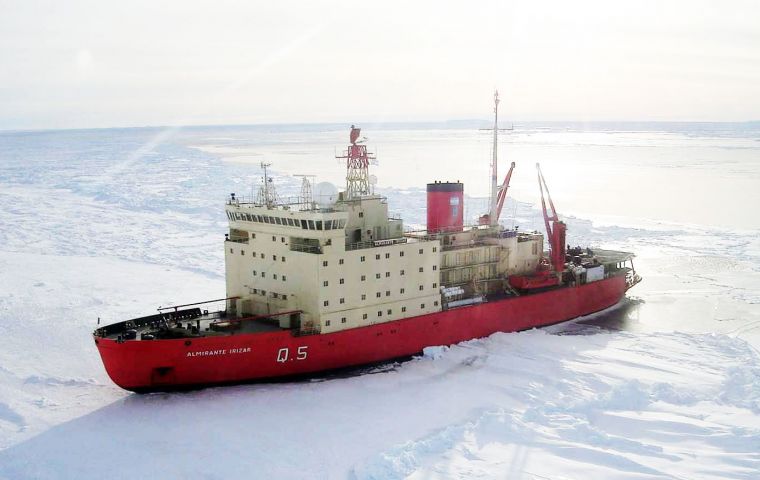MercoPress. South Atlantic News Agency
Argentine icebreaker rescues US scientists stranded in an ice island
 The four scientists and a support staff member, who were conducting research at Joinville Island, were airlifted by helicopter to the Almirante Irizar icebreaker.
The four scientists and a support staff member, who were conducting research at Joinville Island, were airlifted by helicopter to the Almirante Irizar icebreaker. A group of US scientists who were stranded in an ice-bound island off the northeastern tip of the Antarctic Peninsula were rescued on Sunday by an Argentine icebreaker, US and Argentine authorities announced Monday.
The four scientists and a support staff member, who were conducting research at Joinville Island, were airlifted by helicopter to the Almirante Irizar icebreaker.
Argentina’s Foreign Ministry said that the US icebreaker Laurence M. Gould was unable to carry out the evacuation because the ice barrier was too dense on the Weddell Sea in front of the island that is south of the Argentine mainland. The US Antarctic Program then requested assistance from Argentina.
Argentina’s Armed Forces said that the five are in good health and will be transferred to the US vessel when weather conditions improve.
The US National Science Foundation’s Office of Polar Programs said the scientists are led by Alexander R. Simms, an associate professor of earth sciences at the University of California, Santa Barbara. The support staff member is an employee of the NSF’s Colorado-based Antarctic support contractor.
“The US Antarctic Program expresses its gratitude to their Argentine colleagues for their willingness to help,” it said.





Top Comments
Disclaimer & comment rules-

-

-

Read all commentsYes, EM and when ordinary folk can sleep soundly in their beds safe in the knowledge that a group of noxious armed thugs arent going to arrive in the middle of the night to steal their homes and land, wont that be nice?
Mar 13th, 2018 - 05:47 pm +4Trust it won't eventually do the roll over trick or disappear without trace like other Argie craft?
Mar 13th, 2018 - 12:40 pm +3The fact remains that uti possidetis juris fails to square properly with the legal establishment of non-Hispanic states in the New World, as well as with the more recently evolved principle of decolonization and self-determination. Furthermore, save for the Latin American states, succession from the original Spanish rights has neither commanded widespread respect nor attracted international acceptance, either in practice or in principle. The dearth of contemporary legal appreciation for uti possidetis juris strongly suggests that it contributes only a modicum, if any, legal support to either Argentina's or Chile's assertion to valid title over claims in the Southern Ocean or Antarctica. In short, consideration of intertemporal law and factual conditions, especially the extent to which the territorial sovereignty of Spain was actually manifest in the Antarctic casts serious doubts about the legal propriety or validity of the uti possidetis argument today. (79) ('Antarctica and the Law of The Sea,' Joyner C,* Nijhoff, M Publishers, p59-60, 1992, quoting, 'Conflict of Sovereignties in Antarctica,' Yearbook of World Affairs, Daniel J, p 262-66, 1949; 'The American Antarctic,' American Journal of International Law,' p603, Hayton R.D., 1956; and 'Antarctic Law and Politics,' Auburn, F.M. P50, pub C Hurst 1982).
Mar 13th, 2018 - 03:46 pm +2*Associate Professor of Political Science and Member of the School of International Affairs, George Washington University, Washington D.C.
To believe that the Falkland Islands and the territories in the Southern Ocean belong to Argentina because of the inheritance is incorrect. Falklands – Argentina's Inheritance Problem (1 pg): https://www.academia.edu/35194694/Falklands_Argentinas_Inheritance_Problem
Commenting for this story is now closed.
If you have a Facebook account, become a fan and comment on our Facebook Page!